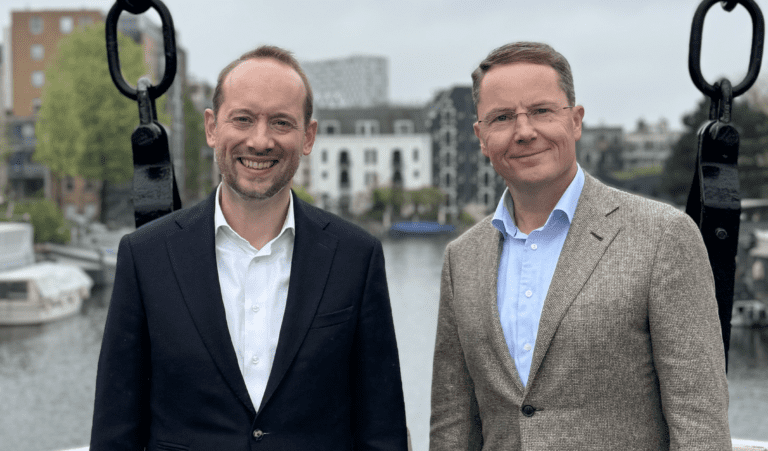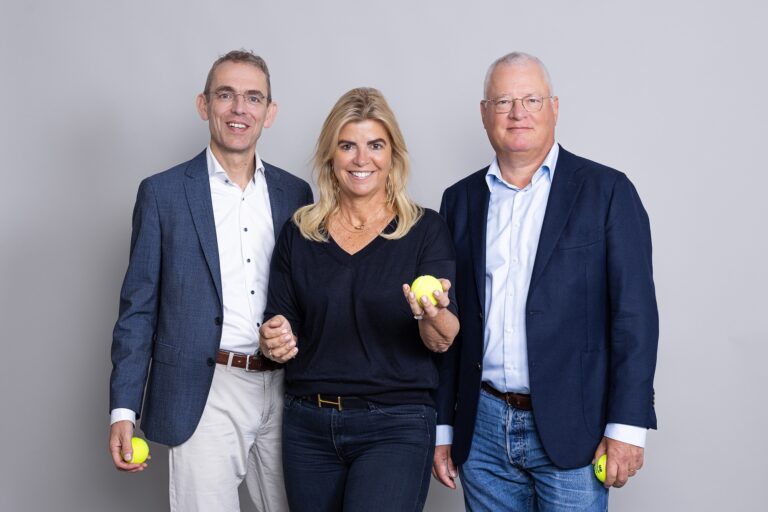
RIFT writes history with Iron Fuel Technology
Our portfolio company RIFT has successfully heated 500 households in Helmond (The Netherlands) without any carbon dioxide emissions, demonstrating their Iron Fuel Technology™ in a realistic and industrial context. A global first for the technology that, by burning iron powder, enables decarbonization for energy-intensive industries, which are not able to with current alternatives. “Successfully completing RIFT’s first development phase is a major milestone, and an important step towards reaching the climate goals and our own goal of reducing carbon dioxide emissions by 1 Gigaton a year by 2050. That’s about 7 times what The Netherlands currently emit on an annual basis”, says CEO Mark Verhagen.
Last year, RIFT and their partners put into operation the first of its kind Iron Fuel Production set-up at the Energy Demo Field in Arnhem and a 1MW Iron Fuel Boiler installation connected to Ennatuurlijk’s district heating network in Helmond. Thereby setting out to prove the Iron Fuel Technology™ in a real industrial context for the first time, within the current framework of law and regulation.
On the 19th of August last year, the first iron flames heated 500 households without the emission of carbon dioxide and the lowest nitrogen oxide emissions ever. The rust, the only residual product of the process, was successfully converted back into iron fuel in RIFT’s Production set-up in Arnhem. To ensure reproducibility, RIFT continued their tests until the beginning of 2023, adding up to a total of 40 hours of actual testing, heating these households solely on Iron Fuel and thus preventing 5 tons of carbon dioxide and 66% of nitrogen oxide emissions.
The months of testing and validating, proved the most crucial fundamentals of the Iron Fuel Technology™ in an actual industrial environment, meaning stable conversion and flames, with minimized emissions and maintaining product quality. Frank Soons, Innovation Manager Ennatuurlijk: “Normally, getting a project like this off the ground takes up to two and a half years. We were incredibly impressed with the vigor RIFT showed, and of course the positive results they demonstrated.” Now RIFT closed the first of three development phases towards commercial implementation. CEO Mark Verhagen: “We did it! We started off with just our designs and a giant list of things to prove. Being able to say, after all these months of testing, we were able to provide 500 households with sustainable heat, makes me immensely proud and hopeful.”
The road ahead
With the successful completion of this stage, RIFT is a step closer to bringing the technology to market. In the next phase RIFT will build and test the second generation of their systems, focusing on mass recovery, energy efficiency and circularity. Both partners, Ennatuurlijk and Veolia Netherlands, have expressed their commitment to RIFT and their technology. Jan Lenstra, CEO Veolia: “”As Veolia Netherlands we are always on the look-out for new solutions and approaches. We are truly impressed by the work RIFT has done in the last year and look forward to working with RIFT in the future”.
The startup already ensured investments and funds for the next development phase, adding up to € 11 million. One of the most eye-catching names in the list of financiers being Breakthrough Energy Fellows, founded by Bill Gates.
To ensure commercial implementation, RIFT and potential users are simultaneously working towards investment decisions for the following development phase, the commercial pilot projects. CEO Mark Verhagen: “With our partners we made the impossible possible, which makes us incredibly proud. Although the next steps won’t be easy, our accomplishments fuel our belief that we will be able to reach our goal to reduce carbon dioxide emissions by 1 Gigaton a year by 2050.”
Decarbonizing industries with no alternative
The Iron Fuel Technology™ enables energy-intensive industries, like district heating, industrial and electricity plants, to decarbonize their heat reliant processes. As of now, they create this heat by burning fossil fuels, resulting in 40-52% of all global carbon dioxide emissions. The two alternatives that these industries currently have, electrification and hydrogen, depend on a grid connection which in 80% of the cases does not nor will not exist.
With the Iron Fuel Technology™, RIFT eliminates this dependency, opening these industries up to becoming sustainable. Simply said, the technology works by rusting and unrusting iron in a controlled environment. In a boiler system, the iron fuel (iron powder) is combusted, releasing enormous amount of energy, carbon dioxide free and with the lowest nitrogen oxide emissions of all fuels. The rust, the only residual product of this process, is easily transported to an Iron Fuel Production system in which it is un-rusted using hydrogen. Making it a circular long duration energy carrier.
The history and background of RIFT
The idea of using iron as a fuel is not a new one. As early as the 1920’s it is mentioned in publications, but with the widespread acceptance of the use of fossil fuels there was no incentive to develop it further. But in 2015, when Prof. Philip de Goey starts a research program with three of his students at the Eindhoven University of Technology, the concept truly takes off. It turns into student team SOLID, which in turns resulted in the start of RIFT. Simultaneously, the academia grew under the supervision of Prof. Philip de Goey. Prof. Philip de Goey: “This shows once again that the world needs critical thinkers and innovators, and that academia is the place where that can emerge and be fostered. Being a part of the incredible journey of iron fuel so far, fills me with pride.”
RIFT is a spin-off of student team SOLID of the Eindhoven University of Technology, and was founded by ex-SOLID members Mark Verhagen, Lex Scheepers and Vincent Seijger. With RIFT they set out to commercialize the Iron Fuel Technology™ focusing on the potential customer needs and requirements. To reach their commercial vision, they created a development plan of three steps, financing the first one by themselves, the RVO Vroege Fase Financiering, Rabobank Innovatielening and partner contributions. Having successfully completed the first step, RIFT now focuses on building new systems to further prove the technology and grow their team from 30 FTE to 40 FTE this coming year. In order to do so, they have already secured € 11 million in finances.


